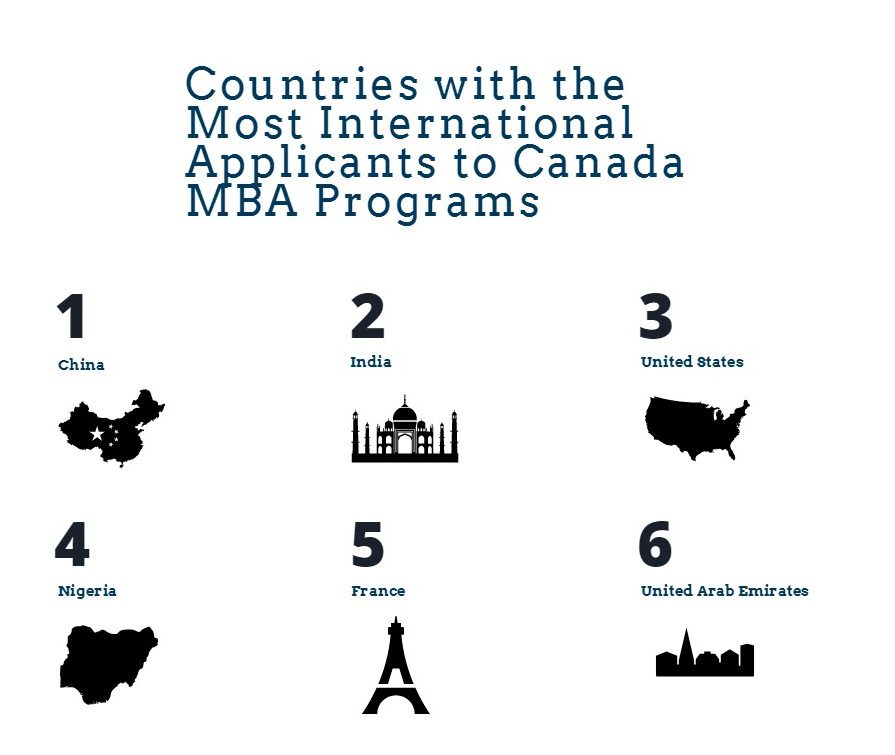Bloomberg Ranks Ted Rogers MBA Among World’s Best

Just a few weeks after Bloomberg Businessweek debuted its list of the top U.S. MBA programs for 2017, the publication revealed its ranking for the best international schools, with the Ted Rogers School of Management at Ryerson University being lauded as not only one of the best schools in Canada, but one of the best in the world.
The Bloomberg Businessweek ranking looks at factors such as the success rates of alumni in starting careers, starting wages, and surveys from recruiters, current students, and graduates of the program.
This marked the first time the Bloomberg Businessweek ranking has featured the Ted Rogers MBA, but the program’s success has not gone unnoticed, especially in Canada. The school is also regarded as one of the 100 best MBA programs in the world by The Economist and by the Canadian Business’ Top 10 Canadian MBA programs four years in a row. The program also placed in the top ten this year among the Bloomberg‘s ranking of top salaries and job placement for recent graduates.
Since its creation in 2006, the Ted Rogers MBA has been highly regarded for its innovative approach to business education and location at the center of Toronto’s business district. “From the beginning the Ted Rogers MBA benefitted from strong leadership, a commitment to excellence, and a focus on students’ careers,” Ted Rogers MBA Director Kim Bates said in a press release following the release of the annual ranking.
“As a startup program, we were able to configure our programs to reflect the new century and differentiate from our established competitors,” she adds. “Our career results are excellent, program delivery and commitment of faculty and staff are exceptional, and we have had support from our academic leadership to admit only high-quality students.”
French business school INSEAD led the way in this year’s ranking, taking over for the London Business School (LBS), which swapped the number one and two spots from last year. Ted Rogers, 24th overall, was one of five Canadian business schools to land on the list, with the Ivey Business School at Western University Canada earning the highest ranking among the group—11th overall.
Check out the entire 2017 Bloomberg Businessweek international MBA ranking here.
Why Bloomberg Businessweek Is Praising the UGA Terry College of Business

At the top of last month’s annual Bloomberg Businesweek domestic MBA rankings, the normative favorites reigned supreme, with the likes of the Harvard Business School, the Wharton School at the University of Pennsylvania, and the MIT Sloan School of Management sitting at the top of the ranking. A quick glance at the top 20 features more of the same, with Ivy League institutions coming in strong, as well as other large school powerhouses like the UCLA Anderson School of Management.
But the real meat and potatoes of the list, beyond stacking trophy cases for the already trophy-rich schools at the top, are the schools that shoot up the rankings the most, sometimes jumping eight or more spots from the previous year. Among the most lauded institutions that made its way up the rankings is the University of Georgia Terry College of Business, climbing from 65th overall in 2016 to 55th overall this year.
Santanu Chatterjee—the full-time MBA Director and Associate Professor of Economics at the Terry College of Business—recently spoke with MetroMBA, saying that part of the reason the school has earned such high praise is because of the concentrated effort of life after graduation.
The school has “a purposeful and deliberate strategy that connects admissions, student experience, and career management, by focusing on employability at the front end, a high level of customized career services for both students and employers, and a market-driven curriculum that ensures professional success for our students,” according to Chatterjee, who originally joined the Terry College of Business in 2001, just after earning his Ph.D. in economics from the University of Washington.

Santanu Chatterjee, Terry College of Business Director, Full-Time MBA Program and Associate Professor.
Although the Terry College of Business is part of the University of Georgia, one of the largest state schools in the U.S., its reputation still lags a bit behind some of the other big name brand institutions. As evident in its climb in the Bloomberg Businessweek ranking, however, its reputation as one of the better, under-the-radar business schools may be soon changing as the result of a plan that has been years in the making.
“Over the past three years, we have focused on making our curriculum more sensitive to the needs of the marketplace,” he says. “Initiatives have included new concentrations in Healthcare Management and Human Resource Management, areas of emphasis in Consulting and Financial Technology (FinTech), and an expanded focus on experiential/project-based learning. Most of our students complete one project with a corporate partner before their summer internships. We have also revamped our Leadership Fellows Program, and set up two new advisory boards, in Atlanta and in the Silicon Valley.”
Part of the wave of program changes over the past few years also comes from newfound partnerships with many of the University of Georgia’s other esteemed colleges, establishing newfound dual degree programs to help facilitate an academic edge many of the country’s smaller schools simply cannot provide.
“While we continue to work on making the MBA curriculum more market-driven, we are also focused on a more interdisciplinary approach to business education,” he says. “Over the past three years, we have worked to develop new dual degree programs with the College of Engineering, Law School, Medical School, and the College of Public Health. New dual programs are currently being developed that include the College of Pharmacy and a one-year STEM MBA for UGA undergraduates in the STEM disciplines. A new one-year Master of Science program in Business Analytics is also awaiting final approval from the University System. These new programs will enable us to significantly expand our corporate relationships and partners, which in turn will help support our curriculum and student support initiatives.”
The use of broader university resources speaks to what Chatterjee believes is becoming a definitive advantage to not only Terry College of Business students, but University of Georgia students as a whole.
“Across the board, the Terry College of Business is focused on student success by providing them with an outstanding academic and experiential learning experience,” he notes. “This philosophy cuts across programs at all levels, from undergraduate to the Masters and Ph.D. [programs]. We have a roster of world-class faculty, excellent facilities, and a dedicated network of more than 70,000 alumni who work tirelessly to improve the quality of education and career success for our students.”
Even with the noted praise Chatterjee eschews for the business school, one program strength he may be overlooking is the welcomed affordability of the Terry full-time MBA, which only costs Georgia-based residents $15,670 per year, compared to several of the more popular MBA programs in the U.S., which often venture into triple digit territory by the end of the program.
For more information on the Terry College of Business and its increasingly praised MBA program, head over to the official Terry College of Business website.
How To Avoid Costly MBA Résumé Mistakes

Submitting a résumé is perhaps the most crucial part of every prospective MBA’s application process. A good résumé provides insight into who an applicant is, and what they’ve accomplished. A well-crafted, attention-grabbing résumé that captivates an admissions team can bring an applicant much closer to an acceptance letter.
But aside from a name, contact info, and educational and professional details, what should a slam-dunk MBA resume include?
What Are The Résumé Basics?
Starting with the principle basics, résumés should be short, sweet, and concise. Ideally, they should fit on one page—maybe two. Stephan Kolodiy, an admissions officer at Rutgers University, told U.S. News & World Report that long résumés are a common issue with many MBA applicants.
“Sometime we get a résumé that’s five to six pages long, and that’s way too much information,” he says.
That one-to-two pages of concise information should also be 100 percent accurate—one should never lie on a résumé. Because credibility plays a big role in the application process (MBA or otherwise), it is unwise to fabricate work or school experience. Deceitful, even exaggerated, résumés are always rejected by business schools, and admitted students who submit compromised résumés are at risk for expulsion. This is serious stuff, so don’t lie!
Carrie Marcinkevage, MBA Managing Director at the Smeal College of Business at Penn State University, told U.S. News that honesty is always the best policy.
“Authenticity allows you to find the right school and that school to find you,” Marcinkevage says. “Allow them the chance to find the real you.”
Perhaps most importantly, all MBA résumés should provide examples of success. Prospective MBAs should give admissions officers a reason to send an acceptance letter by showing concrete examples of career advancement, or of how an MBA candidate achieved results for a particular client.
“When applying to a top-tier business school, you’ll need to show admissions committee on a clear path of professional growth,” U.S. News reports.
What Are You Forgetting?
There are also some not-so-basic guidelines that MBAs are encouraged to follow when crafting a solid résumé. Investopedia published a guide reviewing some of the best resumes for MBA applicants that outlines a few tips that many prospective business students may not have previously thought of.
Without sounding like too much of a graphic design nerd, it’s important to take typeface into account with a résumé. Yes, fonts matter. It’s best practice to rely on on two typefaces: A bold sans-serif face for headers, and a standard serif face for body type. For those of you who don’t know, a serif is the tiny extension on the termination point of an individual letter, the little “hat” at the end of a letter if you will.
Serifs exist to make smaller text easier to read, so they are the best friend of admissions offices who may read hundreds of résumés per day. Sans-serif fonts—letters that don’t include serifs—are cleaner and pop easier when bolded out. Résumés should avoid using fonts that are too common, such as Times New Roman, but also avoid ridiculous fonts like Comic Sans. Nobody likes Comic Sans.
Aside from listing relevant work experience, and showing how much growth took place at each job, there are other skills that every résumé should highlight. According to U.S. News, the three skills that can best help sell an MBA applicants résumé to a business school are:
-
- Leadership
- Communication
- Innovation
First and foremost, business schools want to see strong leadership skills as well as personal growth. All MBA programs focus on developing management skills, but schools wants to know that a solid foundation of leadership is already there. Good résumés provide evidence of an applicant motivating a team behind a common goal, figuring out the best use of other’s talents and skills, instilling a concrete vision, and prioritizing the needs of an organization above personal needs.
As for communication, a résumé is an applicant’s first line of communication to a business school, and should be chock-full of structured writing and thought-out word choice. U.S. News shows the different between a boring resume and beautifully worded one:
“Here’s a real example of a blah bullet point in a client’s first draft: ‘Helped with new software implementation.’
Now, a brilliant bullet point: ”Spearheaded software upgrade in the San Francisco field office by coordinating with software developer, leading training sessions, and facilitating implementation schedule.’ The second example offers a much more comprehensive understanding of the scope of the accomplishment.”
Some applicants may try to hard to impress admissions officers with technical jargon or fancy terminology. Lose it, and show that you can clearly, and simply explain headier topics in writing:
“One client listed this bullet point on his resume: ‘Created VA1 Business Acquisition.’
Once we translated that into something the MBA admissions audience would understand, the résumé said: ‘Devised and launched outbound communications plan for our premier voice activated product. Product was well received and became cash flow positive within 14 months.’
Much better.”
Lastly, a résumé that shows an applicant has helped innovate will go a long way. This piece of advice is especially handy for applicants with traditional pre-MBA jobs. All admissions officers know what a consultant or analyst is tasked with at an entry-level position. A resume is an opportunity to shed light on things that sets an applicant apart from other typical analysts. Things to keep in mind include: training a newly hired analyst, leading college recruiting efforts, or organizing an office volunteering or fundraising initiative.
Avoiding Deceptive Mistakes
Now, here’s where we can get a little dramatic: Résumés are the first impressions a prospective MBA job candidates has with a potential employer. Since no one gets a second chance to make that first impression, don’t mess it up!
Bloomberg issued a list of the “Ten Biggest Resume Blunders” that outlines exactly what not to do with an application résumé, which includes obvious items like avoid writing a bad cover letter and remove foolish typos and inconsistencies.
The list also features some gems, like how to avoid making your résumé a cluttered mess. Again, not to sound like a graphic design professor, but the look of a résumé certainly counts. Avoid using fancy graphics or designs, and provide a crisp, clean document that’s easy to read on a computer screen.
“The résumé should be presentable, not an information dump,” Chris Thomas, Global Recruiting Director of the Experienced Commercial Leadership Program at General Electric, told Bloomberg. “There should be some white space.”
A well-done résumé shouldn’t misfire on any points—bullet points, that is. Some schools offer formats for resumes, specifically on how to list past job experience. Schools like the University of Michigan Ross School of Business advise students to use the “Action Context Result” format, which describes an action they performed, where they performed it, and the results it garnered.
“‘Worked for XYZ Corp., 2008 to 2012’ says close to nothing,” Damian Zikakis, Director of Career Services at Ross, told Bloomberg. “’Led a review of supplier contracts for the technology division resulting in savings of $250,000 opens doors.”
Lastly, a résumé should never disregard an applicant’s worth, nor should it overshare information. As we mentioned earlier in this piece, a good résumé should demonstrate what an applicant has accomplished and what they can bring to a new employer. It should not feature information that, even if positive, is irrelevant to a desired position.
“Think of the résumé as a future-focused document and not an historical one,” Char Bennington, Director of Career Management at the University of Chicago’s Booth School of Business, told Bloomberg. “Focus on what’s important to the people in the career that you want now.”
How Else Can Your Résumé Stand Out?
To help make sure a résumé stands out in the crowd, consider participating in some relevant volunteer work. David D. Schein, the Director of Graduate Programs for the Cameron School of Business at the University of St. Thomas, told MetroMBA that adding volunteer work to a résumé. With that said, not all volunteer work is equal.
For example, if you volunteer at the SPCA and play with puppies all day, that probably won’t your résumé or your application. Instead, find “responsible positions that deliver a lot of bang for the time commitment,” Schein says. Find a position that will allow you to spend time organizing a major fund-raising activity or event. It should be something that has a demonstrative impact on the organization and illustrates your leadership potential.
Including unique and interesting hobbies can also be a fun way to illustrate your skills and stand out. Schein recommends that applicants choose hobbies that “demonstrate drive and ambition. Some examples might include white water rafting or learning a difficult foreign language like Chinese or Farsi.”
Canada’s MBA Programs are Rising

The recent release of the GMAC 2017 Prospective Students Survey Report revealed some mixed revelations. While the status of smaller U.S. school MBA programs may be up in the air, international programs, particularly in Canada, are looking rosier than ever.
Overall, schools in Canada and Europe saw a 50 percent-plus increase in application volume from international candidates, of which GMAC speculates may be a result of political turmoil, particularly in the United States. This is a direct contrast from four years prior, in which less-than half of the Canada, UK, and other European business schools were seeing international applicant growth.
In the GMAC survey, an anonymous Canadian full-time MBA also noted, “The US presidential election has had a impact on our application numbers. Many international students choose Canada as their first choice.”
Niki da Silva, the Managing Director of the full-time MBA program at the Rotman School of Management at the University of Toronto, recently spoke with the Globe & Mail after the release of the report, saying, “This is our opportunity. We have to be anti-Canadian in this moment and really talk about what we are doing. We don’t tend to do that but we need to.”
By The Numbers
Results from the survey found subtle yet distinct differences between the international applicant pools in the major MBA location destinations.

In the United States, Europe, and Canada, according to GMAC, the two most prolific countries with international applicants were unilaterally India and China, which came in either first or second place for each region. However, for Canada, the remaining top 10 international countries with high applicant pools differed slightly from the U.S. and Europe, especially regarding Middle Eastern and North African countries. The United Arab Emirates (6th most), Tunisia (9th), and Iran (10th) were no where to be found in either the U.S. or European top ten.
Breaking the applicant pools down further, GMAC found an unsurprising correlation between the distribution of citizenship by application for Canada and the U.S. and the new data trends. After Europe, which had the most diverse applicant pool (a tricky stat since Europe is qualifying every country on the continent, while the U.S. and Canada are counted as singular entities), Canada had the world’s second biggest international pool of applicants, with less than 50 percent of Canadian business school students having official Canadian citizenship.
Domestic applications, in contrast, are actually down. But the international pool in Canada is swelling, creating substantial overall growth.
“International applicants comprised the vast majority of applications to business programs in Canada—64 percent of MBA applications and 88 percent of business master’s applications.” – GMAC
Gregg Schoenfeld, GMAC’s Director of Research, also noted upward trend for Canadian schools, saying, “This is the first time in the past five years that the majority, in fact three-quarters [of Canadian schools in the survey], are saying they are growing international volumes.”
“From a speculative point of view, it seems that the U.S. political climate has essentially driven candidates to Canada,” he continued.
YOU MIGHT ALSO LIKE: The Highest Starting Salaries for Toronto MBA Grads
The move to enroll more international applicants in Canadian schools started to emerge several years ago. Following lower periods of domestic enrollment, Canada’s MBA programs made a concerted effort to bring in more talent from abroad, creating a multi-year spring in growth that has not only benefited school enrollment, but fostered a positive international environment.
According to Global Affairs Canada, the result has been a positive economic boon as well. Upwards of 90,000 new jobs were created for Canadians just two years prior, while adding $10 billion to the country’s economy.
Tim Daus, Executive Director of the Canadian Federation of Business School Deans, previously noted that the trend was partly made possible because of the country’s flexible immigration policies, saying, “Canada’s visa requirements are much more flexible than other countries’, which gives us an edge. That makes a big difference for students who want to stay and work afterwards.”
Canadian Accolades
The substantial growth Canadian business schools have seen may not solely be the result of political overtones, rather, that many of the country’s best institutions only continue to improve.
The Schulich School of Business at York University in Toronto earned some hefty recognition from Forbes‘ recently released “Best Business Schools” global rankings, earning the 8th spot among the best international two-year program in the world. Schulich grads, Forbes claims, can expect a five-year net gain of over $48,000.
Last year’s Bloomberg BusinessWeek ranking of the best non-U.S. business schools also recognized both the Ivey Business School at Western Canada University and the Rotman School of Management among the top 25 programs in the world. Both the aforementioned Ivey and Rotman programs were recognized among the world’s 100 best by the Financial Times this year as well.
Metro News & Notes: The Business of Improv, Souring on Wall Street, and More

Good morning and happy Friday!
Here are a few stories you may have missed from the week that was …
How Improv Methods from Comedy Can Lift Business Performance | Knowledge@Wharton
There aren’t many part-time comedians and business school professors, but Bob Kulhan doesn’t fit the norm. An adjunct professor at both Duke University and the Columbia Business School, Kulhan is the founder and CEO of Business Improv and co-author of the new book “Yes And”: The Art of Business Improvisation. Speaking on the Knowledge@Wharton podcast about his new work, Kulhan talks about his improv-upbringing in the Chicago comedy scene and how it can be applied in a business setting.
When discussing those in business who struggle to think on the fly, Kulhan notes, “There are all sorts of biases that keep us from just communicating with people and keeping an open mind. What we look for in improvisation is a postponement in judgment and the critical thinking to another side so that we can take in and absorb the offers and opportunities that are being presented to us.”
The concept of “Yes And” (the building block of improv comedy structure), Kulhan notes, can help build individual development, which then helps build team development. “When great minds and intelligent people are sharing thoughts … the collective consciousness of the group will outweigh that of any individual,” he says.
Check out the Knowledge@Wharton podcast today.
A Record Percentage of MBAs Don’t Want to Work on Wall Street | Bloomberg
Training the Street, a New York City-based finance training firm, affirmed what many had already begun to suspect: Wall Street jobs are becoming less appealing.
The new survey data found that MBA graduates would like to work at the largest “bulge bracket banks” at the lowest rates in eight years—right after the peak of the economic recession. Scott Rostan, Founder and CEO of Training The Street, said in a release, “Banks are still a dominant hiring force for MBAs and continue to attract top talent, but working for larger, established companies off of Wall Street is becoming more attractive to MBAs as they offer a different type of lifestyle.”
Bloomberg writer Julie Verhage notes that interest in finance is not necessarily disappearing, however. “Other employment options hit record levels of preference this year,” Verhage notes. “Top choices included consulting firms at 20 percent, corporate development at a Fortune 2000 company at 13 percent and boutique banks at 12 percent.”
Find out more about the survey here.
AI Creeps Into the Work of MBA Career Advisers | Financial Times
The AI revolution may be a little less Terminator 2 (so far) than people might have expected, but it’s still changing the MBA game. In a new piece from the Financial Times, writer Jonathan Moules examines several of the world’s top business schools utilizing AI advantages for students, including Vmock, a helpful student résumé assistant created by grads from the Chicago Booth School of Business and Northwestern Kellogg School of Management.
“More than 100 higher education institutions, including 17 of the top 20 business schools on the FT MBA ranking list, pay an annual subscription for Vmock’s software,” Moules writes. The cost to use the program is a modest fee of $19.95, with over one million résumés already uploaded.
Like Vmock, much of the AI-infused technology used in business schools was “born out of a frustration the founders felt as MBA students themselves.” Moules’ sources insist that the infusion of tech will not replace the hands-on help of career advisers, but I doubt many of them are ready for Terminator 2 world either.
Metro Jobs Report: Career Advice, Goldman Troubles and More

Let’s dig into the latest job news …
